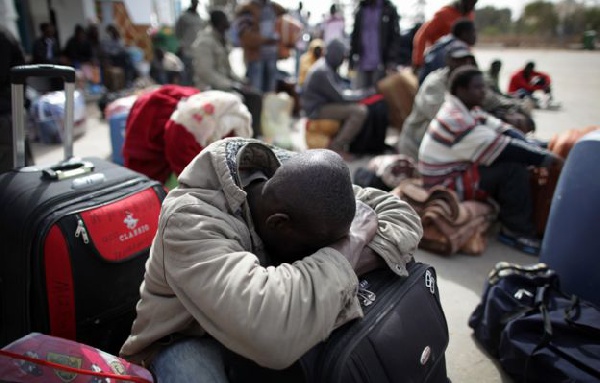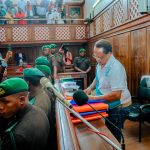
The latest chapter in US President Donald Trump’s vast, opaque deportation programme, their saga became public earlier this month when Ghanaian leader John Mahama disclosed that his country had struck a deal to accept deportees from the region.
Eight to 10 west African nationals have since been forcibly sent by Ghana to Togo, bypassing a formal border crossing and left on the street without passports.
“The situation is terrible,” said Benjamin, a Nigerian national, who told AFP over the weekend he was staying in a hotel room with three other deportees and only one bed, living off money sent from their families in the United States.
Benjamin said an immigration judge had ruled in June that he couldn’t be deported to Nigeria, citing risks to his life because of his past involvement in politics.
He had expected to be released to his wife and children, who are US citizens.
He said he was beaten by Immigration and Customs Enforcement (ICE) agents when he said he would not board a US military plane headed to an unspecified location — which turned out to be Ghana.
ICE did not respond to a request for comment.
Up to 28 people have arrived in the west African nation so far.
Accra disclosed an initial batch of 14 and US-based lawyer Meredyth Yoon said a second plane that could carry that same amount had since landed — though it was unclear how many people were on it.
The initial 14 deportees had won protections in US immigration courts preventing their removal to their home countries for fear of persecution, their lawyers said.
But Washington is sending them to Ghana as a loophole, Yoon told AFP — with Accra making it clear people will be forwarded on to their home countries.
One, a bisexual man from Gambia, was immediately sent home by Ghanaian authorities and is living in hiding because same-sex relations are criminalised in the socially conservative country, according to court filings.
– Togolese nationals in hiding –
Two Togolese nationals were deported to the Togo border with Benjamin — a pseudonym he is using to protect his identity, as he fears persecution from the Nigerian government.
They were crying, repeating “it’s over, it’s over,” he said, adding that they’ve since gone into hiding.
Benjamin and another deportee, Emmanuel — also a pseudonym — said they spent more than two weeks under military guard in Ghana’s Dema Camp, in the town of Bundase, 70 kilometres (43 miles) outside Accra, with nine other deportees who suffered from exposure to heat, mosquitoes and unsanitary water.
The Ghanaian military eventually told them they were taking them to a hotel.
Instead, they were driven to the Aflao border crossing, on the outskirts of Togolese capital Lome, and with the cooperation of Togolese border officials taken “through the back door” of the facility and left on the other side.
“We are in hiding right now because we have no type of documents, ID whatsoever,” said Emmanuel, a Liberian national.
Emmanuel came to the United States in the 1990s during the first Liberian civil war and was granted asylum.
Both he and Benjamin had been green card holders and are married to US citizens. Both were sent to ICE detention after serving prison sentences for separate fraud charges.
Emmanuel was fighting his removal in court when he was deported, Yoon said.
The UN human rights office has called on Ghana to stop deporting those sent by the United States “to Nigeria, The Gambia, Togo, Mali, Liberia or any other third country where there are substantial grounds for believing that they would be in danger of being subjected to torture”.
The State Department told AFP “we will pursue all appropriate options to remove aliens who should not be in the United States”.
The Togolese and Ghanaian governments have not commented on the developments.
nro/sn/kjm
© Agence France-Presse






